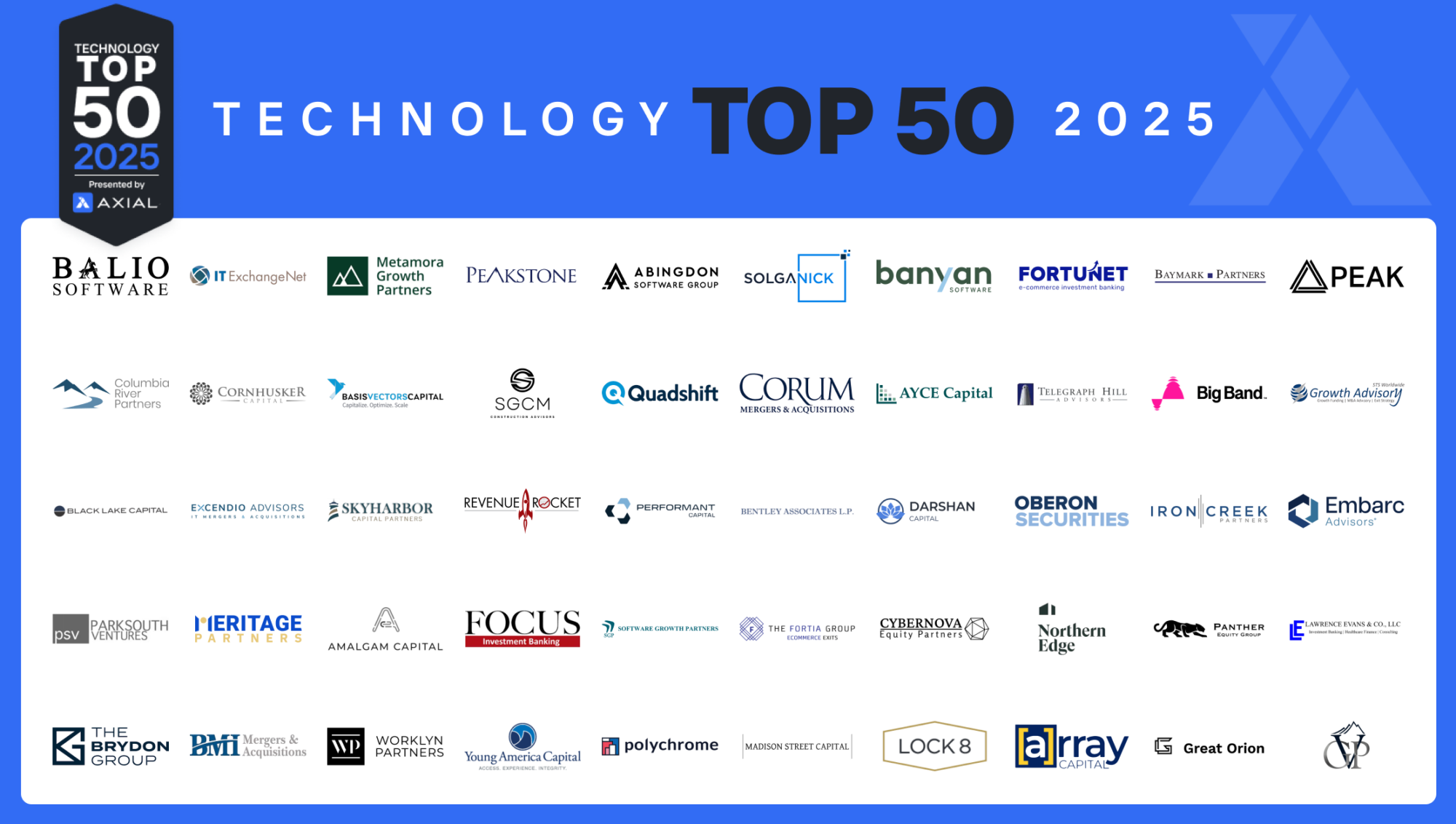
The Top 50 Lower Middle Market Technology Investors & M&A Advisors [2025]
Technology remains a steady presence in the lower middle market, representing ~13% of deals brought to market via Axial over…
“What’s the most interesting thing happening in your sector?” That was the question we asked five senior investment bankers for five hot areas in technology: artificial intelligence, fintech, cybersecurity, healthcare tech, and ad tech:
Ivan Ruzic, Vice President, Corum Group
 Artificial intelligence is no longer technology in search of a problem. We are seeing a wave of enterprise software companies combining unique and robust data sets with machine learning, or deep learning, to create vertical solutions. When executed well, these do something better, faster or at lower cost than human or traditional software automation approaches. As implementation starts to move to later adopters, and given the continuing shortage of capable AI engineers and data scientists, enterprises are increasingly turning to external application providers.
Artificial intelligence is no longer technology in search of a problem. We are seeing a wave of enterprise software companies combining unique and robust data sets with machine learning, or deep learning, to create vertical solutions. When executed well, these do something better, faster or at lower cost than human or traditional software automation approaches. As implementation starts to move to later adopters, and given the continuing shortage of capable AI engineers and data scientists, enterprises are increasingly turning to external application providers.
From an M&A perspective, these AI companies get acquired early — much earlier than normal and at significant valuations — because of their potential to change the rules of the game. From an outcomes perspective, well executed AI presents much more of a zero-sum game where winner takes most, if not all.
Jonathan Kaufman, Managing Director, Moelis & Company
 Integrated payments have taken on new meaning. It used to be focused on the integration of payments with an ERP or system of record in order to provide better data, better data reconciliation and improved efficiencies. We’re now seeing a rise in software companies building or acquiring their own captive payments capability to monetize their own payment flow and improve their economics. Are these software companies with payments or payments companies with software? Payments capabilities are increasingly seen as part of the overall user experience, and making that experience easy and intuitive as well as adding advanced payment capabilities (e.g. to accept recurring payments or payments based on usage) is of greater importance.
Integrated payments have taken on new meaning. It used to be focused on the integration of payments with an ERP or system of record in order to provide better data, better data reconciliation and improved efficiencies. We’re now seeing a rise in software companies building or acquiring their own captive payments capability to monetize their own payment flow and improve their economics. Are these software companies with payments or payments companies with software? Payments capabilities are increasingly seen as part of the overall user experience, and making that experience easy and intuitive as well as adding advanced payment capabilities (e.g. to accept recurring payments or payments based on usage) is of greater importance.
Sam Levy, Principal, Marlin & Associates
 The market is splitting between companies who want point solutions and those who want a one-stop solution. It has become clear that the all of the former group and even many of the latter need security orchestration systems to help them move policies from one solution to another, as well integrate the disparate products. There is a shift from thinking solely about security to thinking about governance.
The market is splitting between companies who want point solutions and those who want a one-stop solution. It has become clear that the all of the former group and even many of the latter need security orchestration systems to help them move policies from one solution to another, as well integrate the disparate products. There is a shift from thinking solely about security to thinking about governance.
At this stage of the cycle, there is not a clear winner between the point solutions and bigger platforms. We don’t see it as a zero-sum game. If you are a smaller company, you’ll probably go with a one-stop shop, but large enterprises will need orchestration regardless of whether they work with the big platforms or all point solutions.
David Baker, Managing Director, Capstone Headwaters
 Pharmacological genomics [editor’s note: also called pharmacogenomics] has been seeing a lot of investment. It’s so new and hasn’t been applied broadly, but the cost of acquiring the genetic profile for a patient has dropped dramatically. Currently, the biggest area of impact is in oncology. We’re learning that it is important to understand the genetic nature of both the cancer and the patient.
Pharmacological genomics [editor’s note: also called pharmacogenomics] has been seeing a lot of investment. It’s so new and hasn’t been applied broadly, but the cost of acquiring the genetic profile for a patient has dropped dramatically. Currently, the biggest area of impact is in oncology. We’re learning that it is important to understand the genetic nature of both the cancer and the patient.
There is going to be a ton of analytics around this, and the data that this is going to produce is monstrous. It’s also going to require new systems to do the analysis.
Nick MacShane, Senior Managing Director, Progress Partners
 Digital audio has been a bit of a sleeper sector for a while, but it is on the rise and growing much faster than the rest of the ad tech industry. The podcast market continues to grow quite quickly and in radio things are shifting from the car to the phone. In 2013, 45% of the population listened to online audio and now it is 64%. We believe that there will be a lot of M&A activity on the content side, i.e. license groups.
Digital audio has been a bit of a sleeper sector for a while, but it is on the rise and growing much faster than the rest of the ad tech industry. The podcast market continues to grow quite quickly and in radio things are shifting from the car to the phone. In 2013, 45% of the population listened to online audio and now it is 64%. We believe that there will be a lot of M&A activity on the content side, i.e. license groups.
Going further into digital audio, we’re really interested in what is happening with digital assistants. Alexa and Google Home are in the early phase of consumer adoption and there has been little-to-no advertising. We don’t think ads will come in the form of a classic radio ad, but rather upsells relevant to the content. For example, if you ask Alexa about the weather, it might respond that it is raining and ask if you want an Uber.
